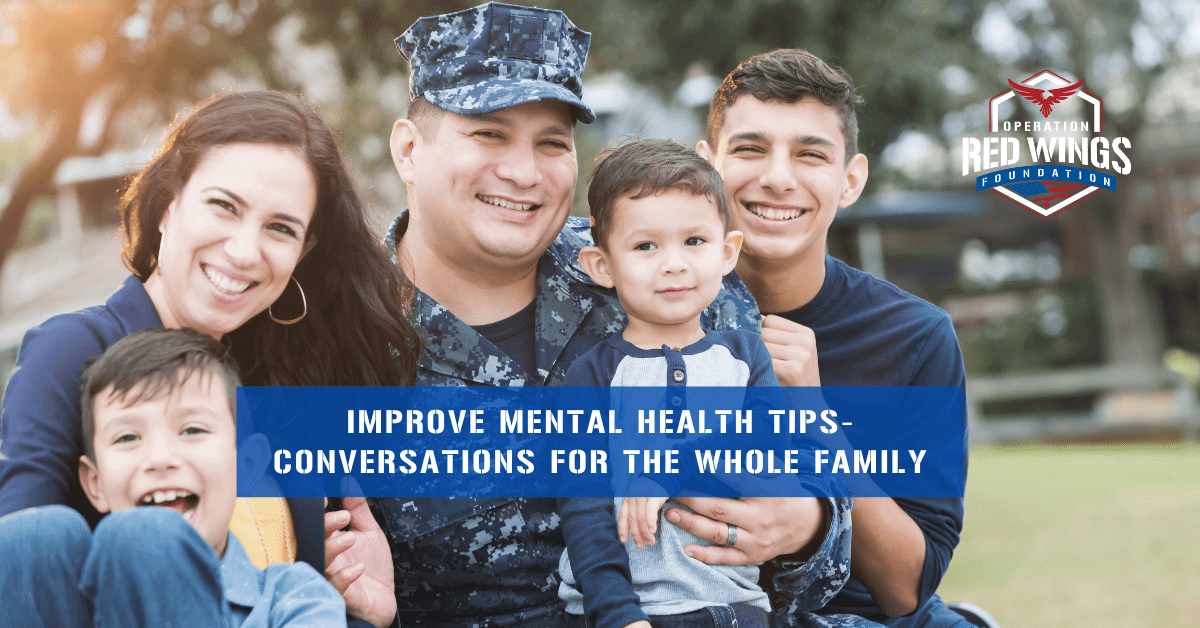46.4% of adults in the United States will experience a mental health issue during their lifetime. Over the course of one year, among adults with a mental disorder, 14.4% will have one issue, 5.8% have two, and 6% have three.
These statistics only take into account the known issues. Many go unreported or undetected due to the stigmas and lack of conversations surrounding them. Read on to learn how to improve mental health, tips to get conversations started, and how to support your loved ones.
What Is Mental Health?
Mental health refers to our emotional and psychological well-being. It encompasses how we think, feel, and act. Additionally, it helps shape how we deal with stressors, interact with others, and make decisions.
Everyone experiences low moments or stress in their lives, but this does not mean they have a mental illness. A person with good mental health has the resilience to manage these problems and keep going. Find out where you are with the help of self-checks.
What Are the Warning Signs of Mental Illness?
Mental illness can show up in many different ways. The signs vary depending on the type of mental illness, how severe it is, and other factors. But there are some common warning signs:
- Overeating or undersleeping
- Avoiding friends and activities you like
- Having little or no energy
- Feeling hopeless, irritable, anxious, angry, or sad
- Feeling worthless or guilty
- Trouble thinking, concentrating, or making decisions
- Thoughts of death or suicide
- Unexplained aches and pains
What Causes Mental Health Issues?
Mental health issues can be caused by a variety of factors. These include:
- Biological traits like genes or brain chemistry
- Things you go through, such as trauma or abuse
- Mental health issues in your family
How Can Conversations Help?
Conversations about mental health can help reduce the stigma surrounding these issues. They can also help people find the support they need to get treatment.
If you are worried about someone, start a conversation. You can say something like, “I’ve noticed you’ve been really withdrawn lately. Are you doing OK?”
If you are worried about yourself, reach out to a friend or family member. Talking to someone who cares about you can make a big difference.
If you are struggling, there are many places you can turn to for help. Here are a few:
- Your doctor or mental health provider
- A mental health hotline
- A support group for people with mental illness
Veterans and Mental Health
Veterans are at a higher risk for mental health issues, due to the nature of their work. Veterans Day is a good time to start a conversation about mental health with a Veteran in your life.
Many experience symptoms of post-traumatic stress disorder (PTSD).
If you are not sure how to start the conversation, here are some tips.
Pick a good time when you can talk without being interrupted. Start by asking how the person is doing. Listen to what they say.
Avoid giving advice or judging them. Ask if there is anything you can do to help. Let the person know that you care about them and are there for them.
Operation Red Wings Foundation
The ORWF is one organization working to improve mental health among Veterans. We offer a variety of therapeutic tools at retreats to help you address mental health concerns.
Mental Healthcare For Veterans
The VA offers a variety of mental health services for Veterans. These include counseling, therapy, and medication.
Mental Health America
MHA is a non-profit organization that works to improve mental health for all Americans. They offer resources, like screenings and support groups.
Improve Mental Health Tips
Mental health is often seen as a taboo topic, but it’s important to talk about it with your family. Here are some tips:
Pick the Right Time
Choose a time when everyone is calm and relaxed. Start by sharing your own experience. This can help open the conversation.
Be Respectful
Listen to what others have to say without judging. Use statements like: “I’m worried about you” instead of “You’re crazy.”
Focus on the present. Avoid assigning blame for past events. Encourage open communication. Let everyone know that it’s okay to talk about mental health.
Avoid judgment or blame. Passing judgment only serves to further stigmatize mental health. Instead, try to be understanding and supportive.
Ask questions. Show that you’re interested in understanding their experience. Offer support. Let them know that you’re there for them.
If they’re struggling, offer to help them find resources that can help, like support groups or hotlines. These conversations can be difficult, but they are important. By starting the conversation, you can help reduce the stigma around mental health and make it easier for people to get the help they need.
Normalize It
Mental health should be seen as a normal part of life. It’s okay to not be okay.
Open communication can help reduce the stigma surrounding mental health. It can also help people get the support they need.
Don’t Pressure Yourself
You don’t have to be an expert on mental health. Just listen and be there for the person. Sometimes, the best thing you can do is simply show your loved ones that you care.
Make Time
Set aside time to talk about mental health. This can be difficult, but it’s important.
Don’t know how to start a conversation about mental health? Here are some suggestions:
“I’ve been feeling _____ lately. Has anything been going on with you?”
“I noticed that you’ve been _____. I’m here for you if you want to talk.”
“I’m worried about you. I wanted to check in.”
“I’m here for you. What can I do to help?”
Tips For Improving Mental Health
If you’re struggling, seek out help from a mental health professional. Talking to someone you trust can be helpful. This could be a friend, family member, or therapist.
Exercise can also help improve your mental health. Plus, eating a balanced diet can help you feel better.
When you’re feeling overwhelmed, take a break from what you’re doing. Doing something you enjoy can help reduce stress.
Connect with others. Spending time with friends and family can improve your mental health.
Every now and then, do something for yourself. Make sure to do something that makes you happy. This could be anything from reading to taking a yoga class.
Support Each Other
Families must continue talking about mental health to help reduce the stigma surrounding it. We should also be encouraging our children to speak up about their mental health and get help if they need it. There are many things that you can do to improve mental health and tips like the ones above are great starting points.
ORW Foundation provides resources for Veterans and their families who are struggling with mental health issues. Attending a retreat is a great way to get support for any issues you may face. Sign up here to get started.






